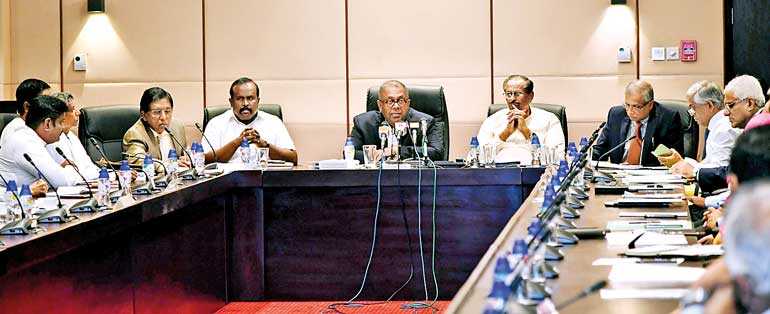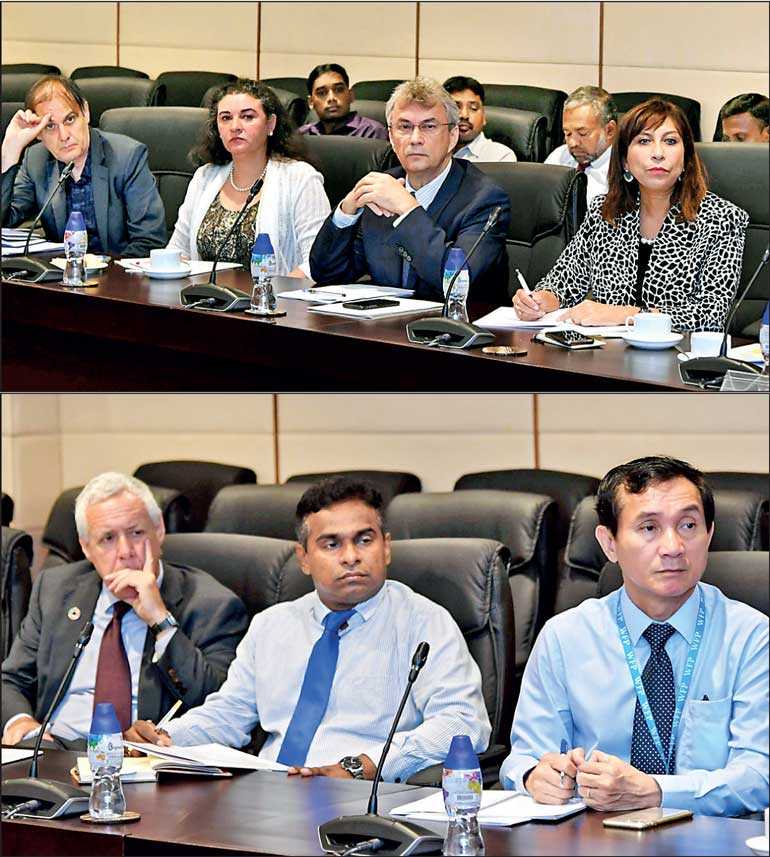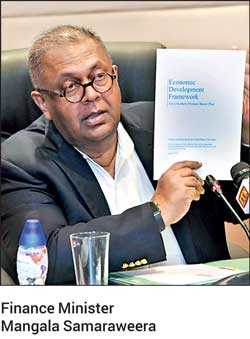Monday Feb 16, 2026
Monday Feb 16, 2026
Monday, 25 February 2019 00:01 - - {{hitsCtrl.values.hits}}



The Government has launched a new development framework for the Northern Province that aims to create a blueprint for growth that focuses on empowering small producers, improving skills and linking infrastructure development with clear economic gains.
Finance Minister Mangala Samaraweera who spoke at the launching ceremony of the new framework praised Central Bank Governor Dr. Indrajit Coomaraswamy who had appointed a committee to develop the framework. The framework was considered after key issues such as rampant indebtedness was brought to the attention of officials.
“In launching this framework drafted by academics and professionals from the North, we have now the possibility to transform these reconciliation oriented development initiatives into a decade-long programme for the sustainable reconstruction and economic growth of the North. The Government realises that development and reconciliation are long-term endeavours, and is prepared to rise up to that challenge,” he said.

Samaraweera also said the upcoming Budget would look at improving allocations to the Northern Province and highlighted the fact that some loans have been written-off by the Government. Selected projects will also be given funds through the Gamperaliya Programme.
The ‘Framework for an Economic Development Master Plan’ aims to be a realistic and dynamic tool to create a blueprint for the future long-term growth and development of Northern Sri Lanka to 2030. A committee to take forward its conceptualisation was established on the request of the Governor of the Central Bank of Sri Lanka. It was observed during meetings held in the North with the participation of the Governor, that the outcomes of post-war development programmes have been inadequate, particularly the crisis of indebtedness that has arisen from the lack of viable employment and incomes for the local population, the report said.
Drawing on perspectives and experience coming out of the region, this framework is offered as a resource for policymakers, donors and civil society to chart a new way forward to bring prosperity and equity to the Northern Province. In doing so, it is hoped that wider objectives of peace, reconciliation and reintegration to the growth of the national economy can also be sustainably achieved.
The report observed that the post-war reconstruction strategy centred on building infrastructure, expansion of credit to promote self-employment and encouragement of private-sector investment however, has not met expectations in delivering sustained economic growth, employment and increased household incomes.
The framework said development initiatives had failed to systematically invest in transforming the productivity of ‘small-sized’ producers and organisations who dominate the Province’s economic base. Second, forthcoming investment did not appropriately build on the existing skills and capacity within the region. Third, the continuing fragility of a population coming out of a protracted war has not been adequately addressed to enable them to meaningfully participate in development. And lastly, the reconstruction strategy itself lacked a clear direction, was not holistic in nature, and together with insufficient coordination, was carried out with a ‘project-based’ mindset which led to sub-optimal outcomes.
“A two-pronged strategy of focusing on strengthening the economic base while supporting initiatives for export development will create a stronger, more resilient economic foundation in the North, from which growth can be accelerated in the long-term,” it added.
Furthermore, in future planning and implementation, challenges specific to the North’s post-war legacy must be considered from the outset. These include the need for leadership to take forward a new economic development agenda, re-orientation towards development programming by implementing actors, greater community participation, workforce development, and planning for uncertainties such as climate change.
The framework seeks to highlight specific development issues and challenges in the North due to the legacy of war which require a unique policy approach. The report provides a perspective from the North, with insight from local knowledge, networks and research. The framework is forward-looking; it takes a holistic macro view of the economy and provides direction for development over the medium to long-term (2030).
The framework is intended as a resource for policymakers, implementing agencies, donors and other actors to support future economic development design and planning processes concerning the North. It is also hoped that the report will be used to generate dialogue within the Province to encourage future participation and ownership of development initiatives.